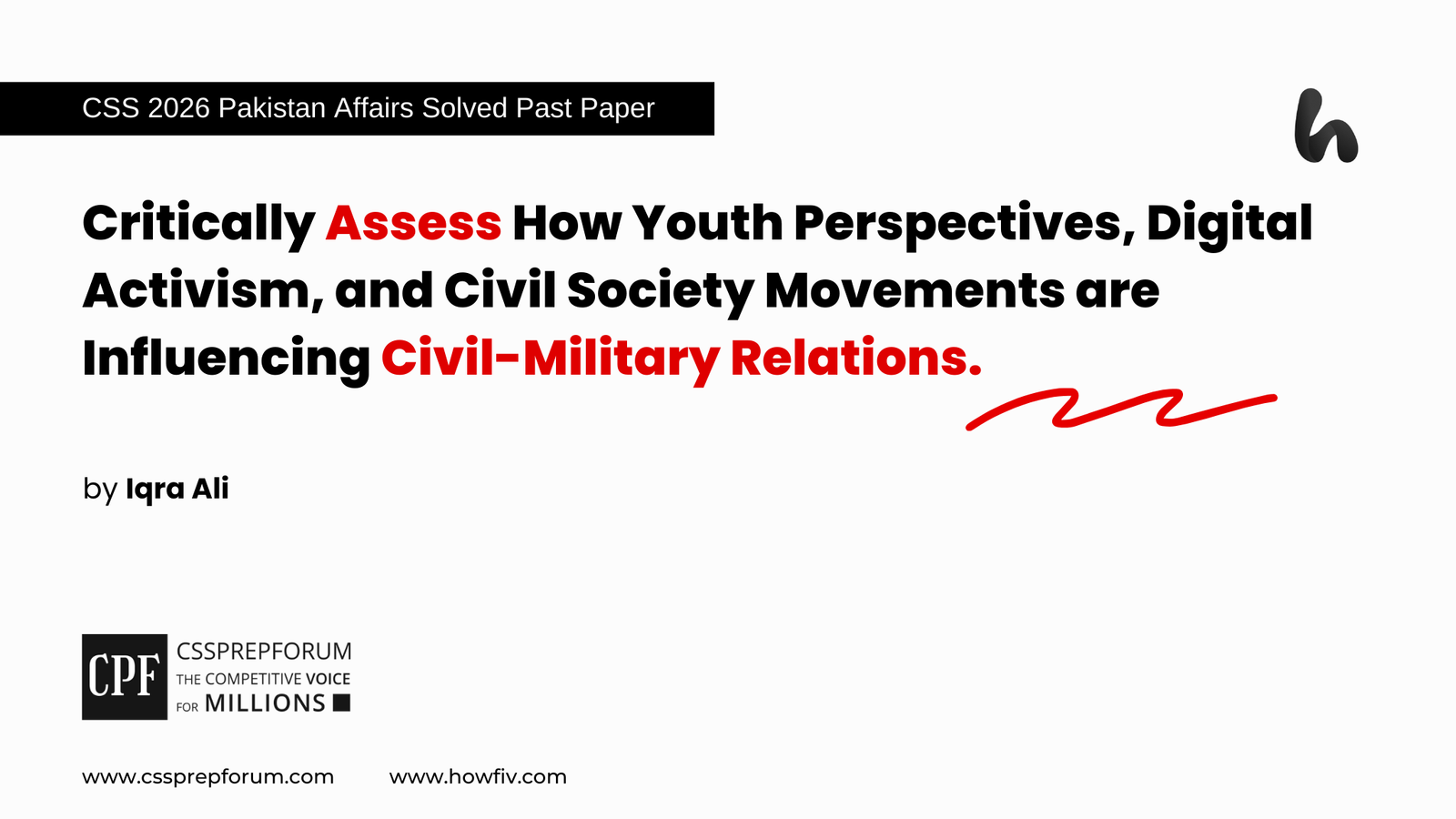CSS 2011 Solved Current Affairs Past Paper | Strategies to Reduce Dependency of Education Sector on Government Funding
The following question of CSS Current Affairs 2011 is solved by Sir Ammar Hashmi, the best Current Affairs Coach, on the guided pattern of Sir Syed Kazim Ali, which he taught to his students, scoring the highest marks in compulsory subjects for years. This solved past paper question is uploaded to help aspirants understand how to crack a topic or question, write relevantly, what coherence is, and how to include and connect ideas, opinions, and suggestions to score the maximum.

Question breakdown
This question has one part, i.e., to outline strategies for reducing the education sector’s dependency on government funding.
Outline
1-Introduction
2-Overview of the dependency of the education sector on government funding
3-Strategies to reduce dependency of education on government funding
- ✓ Public-Private Partnership
Case Study: Private schools adopting a public school for resource sharing, as is the case with the Adopt a School Program, Pakistan
- ✓Corporate Social Responsibility
Case Study: Corporate Social Responsibility funding for schools and resources, as is the case with the PTCL Adopt a school plan
- ✓ Philanthropy and Donations
Case Study: Donations fund schools and scholarships, as is the case with The Citizens Foundation School System
- ✓School Sponsorship Models
Case Study: Private sectors sponsoring public schools, as is done in the case of the Pakistan School Sponsorship Program
- ✓Fundraising Initiatives
Case Study: Frequent and regular online events and donations campaign collecting funds for schools and education, as is carried out by Sabaq Foundation and the Annual Karachi fundraising initiative
- ✓International Partnerships
Case Study: Collaborative international education projects, providing funds for education, as is the case with the Pak-US education partnership, providing 100 million USD in funds
4-Critical analysis
5-Conclusion

Answer to the Question
Introduction
Education, one of the key determinants of a country’s development, has been a primary reason why developed countries have led the development race. These nations have made rigorous educational investments, resulting in social, political, economic, and cultural development. On the other hand, underdeveloped countries have been lagging in the race due to their underdeveloped education sector, resulting in a significant shortage of human resources. And Pakistan is no exception. One reason for their decrepit education sector is the decreased funding allocated to it. Thus, examining the difference, it is evident that the future ahead is bleak unless Pakistan invests in education. Therefore, Pakistan should adopt new strategies, such as public-private partnerships, corporate social responsibility, philanthropy, donations, and fundraising events, making Pakistan less dependent on the government for its budget.
Overview of the dependency of the education sector on government funding
The education sector in Pakistan relies heavily on government funding, which remains insufficient and inefficiently utilized. The state allocates only about 2% of its GDP to education, well below international recommendations, forcing public schools and universities to operate with limited resources. Provincial governments, responsible for education after the 18th Amendment, spend most of their budgets on teacher salaries, leaving little for infrastructure, materials, or quality improvements. Public universities face frequent funding cuts, disrupting research and academic activities. While private schools fill some gaps, they cater mainly to those who can afford fees, widening educational inequalities. Corruption, mismanagement, and economic instability further strain the system, with issues like ghost schools and unpaid teachers undermining progress. Foreign aid and public-private partnerships provide some relief, but long-term solutions require increased funding, better resource management, and systemic reforms to ensure equitable and quality education for all.
Strategies to reduce dependency of education on government funding
The following are some strategies that can be employed to reduce the dependency of education on government funding.
- Public-private Partnerships
To begin with, Pakistan’s education sector should adopt a public-private partnership approach, as hospitals in Khyber Pakhtunkhwa have done. The education sector can also adopt a similar strategy. The ‘Adopt a School Program’ exemplifies how this system works. A report stated that around 500 schools have been established under this program in Pakistan. This way, Pakistan has a chance to progress in the field.
- Corporate Social Responsibility
Second, another option that Pakistan can use is corporate social responsibility funding. This fund should support infrastructure development, utilize available resources, and incentivize students. Pakistan Telecommunication Company Limited has been involved in corporate social responsibility initiatives for a long time and has adopted and funded several schools. Between 2015 and 2020, approximately 50 schools were funded, and 20,000 students were served. Many other institutes, such as PTCL, can also adopt this method.
- Philanthropy and Donations
Third, one of the most widely discussed strategies that nearly every country looks forward to is philanthropy and donations. Seminars, functions, and magazines are shared among citizens, encouraging them to donate to a good cause. The Citizens Foundation School System is one of the successful organizations that is fueled by donations and funding from philanthropists. Around 1500 Schools and 220,000 students have been served. Several other organizations follow a similar strategy. Pakistan’s government and stakeholders can make full use of it, streamlining the donations towards a better future for students.
- School Sponsorship Models
Fourth, school scholarship programs are another option that Pakistan can look up to. In this strategy, private schools partner with public and other private schools, working together for the betterment of students. Pakistan’s School Sponsorship Program is a notable example. As a result, around 1,000 schools have been sponsored, serving 200,000 students. More sponsorships like this are required.
- Fundraising Initiatives
Fifth, the endowment funds also prove beneficial for lessening the burden on the government treasury. Donations for scholarships and research are covered under this program. Lahore University of Management Sciences Endowment Fund is one example of this strategy. Under this strategy, approximately $ 10 billion in endowment funds has been disbursed, serving around 3,000 students annually.
- International Partnerships
Last, international collaboration with developed countries makes it easier for Pakistan to address its education crisis without straining its treasury. For instance, the Pak-US Education partnership is one of the few examples of Pakistan collaborating with other countries to meet its education demands. Owing to these steps, $ 100 million has been invested, and 100,000 students have been served. More collaborations like this are needed to progress in the education sector.
Critical analysis
Critically, it is a fact that Pakistan lags behind many countries in the race for education and development. The reason behind this is a lack of funds and inadequate budget allocation. However, there is another way Pakistan can utilize to alleviate its abysmally poor education status. This includes international collaborations, public-private partnerships, and many funding and donation projects. This way, Pakistan, despite their funding constraints, can still improve its education sector, making Pakistan progress like the developed countries do.
Conclusion
To sum up, reducing the education sector’s dependency on government funding is essential for improving Pakistan’s education system. The current over-reliance on limited and often mismanaged government funds hampers progress. However, strategies such as public-private partnerships, corporate social responsibility, philanthropy, sponsorship models, fundraising initiatives, and international collaborations offer viable alternatives. These approaches, already proven effective through various programs in Pakistan, can collectively ease the burden on the government while ensuring access to quality education. With consistent implementation, these strategies can strengthen the sector and pave the way for sustainable educational development.

CSS Solved Past Papers’ Essays
Looking for the last ten years of CSS and PMS Solved Essays and want to know how Sir Kazim’s students write and score the highest marks in the essays’ papers? Then, click on the CSS Solved Essays to start reading them.
CSS Solved Essays
CSS Solved Current Affairs Past Papers
Looking for the last fifteen years of CSS Solved Current Affairs to learn how to attempt them and to score high? Let’s click on the link below to read them all freely. All past papers have been solved by Pakistan’s top CSS Current Affairs coach having the highest score of their students.
CSS Solved Current Affairs
CSS Solved General Science & Ability Past Papers
Want to read the last ten years’ General Science & Ability Solved Past Papers to learn how to attempt them and to score high? Let’s click on the link below to read them all freely. All past papers have been solved by Pakistan’s top CSS GSA coach having the highest score of their students.
General Science & Ability Solved Past Papers











